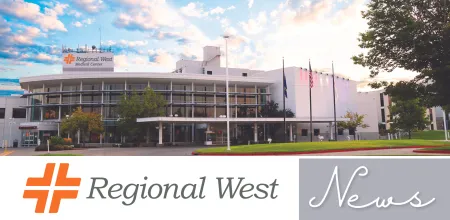Regional West Recognizes Stroke Awareness Month in May

SCOTTSBLUFF, Neb., ― When a stroke occurs, every second matters. Regional West encourages people to learn the signs and symptoms of stroke during Stroke Awareness Month in May.
According to the Centers for Disease Control (CDC), a stroke occurs when something blocks blood supply to part of the brain, or when a blood vessel in the brain bursts. Parts of the brain become damaged or die, which can cause lasting brain damage, disability, and even death. The two most common types of stroke are ischemic strokes, which occur when a blood clot or other particle blocks blood vessels to the brain, and hemorrhagic strokes, which happen when an artery in the brain leaks blood or ruptures. Transient ischemic attacks (TIA), or mini-strokes, block blood flow to the brain for a short period of time but are considered warning signs for major strokes.
“Stroke is the most common sudden neurologic event affecting adults,” said Janelle Schroeder, RN, MSN, SCRN, Regional West’s stroke program coordinator. “If someone recognizes the symptoms of stroke and seeks healthcare immediately, the more likely they will recover without permanent disability. That is why we encourage everyone to learn the stroke warning signs. If you know the signs, you may save a life.”
Stroke’s warning signs can be remembered with the acronym B.E.F.A.S.T., which stands for balance (loss of balance), eyes (loss of vision), face (facial drooping), arms (weakness or numbness in the arms), speech (slurred speech), and time (call 911 immediately). Other symptoms include numbness or weakness on one side of the body, severe headaches, and confusion.
Wayne Flood, Jr., the sole parent of a then 10-year old son, woke up with a bad headache on Oct. 8, 2021. Soon, he began exhibiting symptoms of a stroke, including loss of feeling on his left side, slurred speech, and facial drooping. After his son quickly called 911, Flood was transported to Regional West where a CT scan revealed a hemorrhagic stroke. Flood was flown via Air Link to Swedish Medical Center in Denver, and after 10 days at Swedish he was transferred by ambulance to Regional West’s Acute Rehabilitation Unit (ARU).
“I was a little depressed during my time in Denver, to be honest,” said Flood. “I missed my family a lot. When I was in the ambulance headed back to Regional West, we came over the hill and I remember seeing the valley and the Bluff. I was so happy – I knew I was home.”
Flood stayed on the ARU for almost three weeks. Within a few days, he was out of his wheelchair and taking steps. He quickly progressed to a walker and walked with a cane when he was dismissed from the hospital on Nov. 5, 2021. Flood continued outpatient and physical therapy before a small setback in Jan. 2022 from COVID-19 hospitalization. Now, he’s committed to making healthy changes and focusing on life’s little things.
“My stroke caused me to look at life in a different way,” he said. “I love and appreciate the small things in life now; walking outside, smelling the fresh air, and just enjoying the beauty of it all. Being able to do that is precious to me.”
Regional West’s Stroke Program is designed to provide evidence-based primary stroke care, including evaluation, treatment, and education to patients who present or are transferred with signs and symptoms of stroke or transient ischemic attack (TIA). Physicians, advanced practice providers, and nurses provide acute stroke care services 24 hours a day, seven days a week to help all patients receive exceptional, innovative treatment. Regional West is certified as a Primary Stroke Center by the Joint Commission and the American Heart Association/American Stroke Association.
“Regional West is proud to provide exceptional stroke care to our region’s patients,” said Leslie Cavazos, MD, Stroke Program medical director. “We have a great care team that works together to help stroke patients receive innovative healthcare.”
To learn more about Regional West’s Stroke Program, visit https://www.rwhs.org/services/trauma-emergency/stroke.
Regional West Health Services in Scottsbluff, Neb., is the parent company of Regional West Medical Center, a 188-bed regional referral center and the only Level II Trauma Center in Nebraska west of Kearney. As the region’s only tertiary referral medical center, Regional West offers care that spans more than 32 medical specialties provided by over 28 physician clinics. Regional West provides comprehensive and innovative healthcare services for the people of western Nebraska and the neighboring states of Colorado, South Dakota, and Wyoming.








